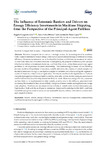Mostrar o rexistro simple do ítem
The Influence of Economic Barriers and Drivers on Energy Efficiency Investments in Maritime Shipping, From the Perspective of the Principal-Agent Problem
| dc.contributor.author | Longarela-Ares, Ángeles | |
| dc.contributor.author | Calvo-Silvosa, Anxo | |
| dc.contributor.author | Pérez-López, José-Benito | |
| dc.date.accessioned | 2020-11-09T18:39:42Z | |
| dc.date.available | 2020-11-09T18:39:42Z | |
| dc.date.issued | 2020 | |
| dc.identifier.citation | Longarela-Ares, Á.; Calvo-Silvosa, A.; Pérez-López, J.-B. The Influence of Economic Barriers and Drivers on Energy Efficiency Investments in Maritime Shipping, from the Perspective of the Principal-Agent Problem. Sustainability 2020, 12, 7943. https://doi.org/10.3390/su12197943 | es_ES |
| dc.identifier.uri | http://hdl.handle.net/2183/26665 | |
| dc.description.abstract | [Abstract] Maritime transport stands out as a strategic sector; the increasing trend in maritime traffic makes it essential to reduce energy consumption and emissions through investment in energy efficiency. However, investments can be hindered by barriers, and drivers are necessary to reduce or overcome them and promote investment. Consequently, the purpose of this study is to analyze what factors influence investment decisions—and how they do so—when there are principal-agent problems in the shipowner–charterer relationship. The methodology is based on the following process: model and hypotheses formulation, variable definition, the creation of a study sample and statistical treatment through a descriptive analysis of variables and a binomial logistic regression model, all based on a state-of-the-art application. The results corroborate the hypotheses and indicate that principal-agent problems and split incentives, especially in time charter contracts, and a lack of verified information make the shipowners less likely to invest. Moreover, energy efficiency measures are less likely to be implemented in older vessels, possibly due to the difficulty associated with recovering the investment; they are more likely in larger and newer vessels, and regulation encourage their adoption. Furthermore, investment is more likely in vessels with verified information and high levels of both activity and harmful emissions. Improved knowledge in this field could help businesses and governments to act in a more sustainable manner, without detriment to an innovative and competitive sector. | es_ES |
| dc.description.sponsorship | Xunta de Galicia; ED481A-2015/224 | es_ES |
| dc.description.sponsorship | This research was supported by Consellería de Cultura, Educación e Ordenación Universitaria, Xunta de Galicia, grant number Ref. ED481A-2015/224 “Axudas á etapa predoutoral” Galician Plan of Research, Innovation and Growth 2011–2015 (Plan I2C) and Agencia Estatal de Investigación (Ministerio de Ciencia, Innovación y Universidades) under research project with reference RTI2018-100702-B-I00, co-funded by the European Regional Development Fund (ERDF/FEDER). | es_ES |
| dc.language.iso | eng | es_ES |
| dc.publisher | MDPI | es_ES |
| dc.relation | info:eu-repo/grantAgreement/AEI/Plan Estatal de Investigación Científica y Técnica y de Innovación 2017-2020/RTI2018-100702-B-I00/ES/RIESGOS CLIMATICOS, ESTABILIDAD FINANCIERA Y DECISIONES DE INVERSION EN LOS MERCADOS FINANCIEROS | |
| dc.relation.uri | https://doi.org/10.3390/su12197943 | es_ES |
| dc.rights | Atribución 4.0 Internacional (CC BY 4.0) | es_ES |
| dc.rights.uri | https://creativecommons.org/licenses/by/4.0/ | * |
| dc.subject | Barrier | es_ES |
| dc.subject | Driver | es_ES |
| dc.subject | Energy efficiency | es_ES |
| dc.subject | Investment | es_ES |
| dc.subject | Finance | es_ES |
| dc.subject | Management | es_ES |
| dc.subject | Sustainability | es_ES |
| dc.subject | Maritime transport | es_ES |
| dc.subject | Principal-agent problem | es_ES |
| dc.subject | Shipping | es_ES |
| dc.title | The Influence of Economic Barriers and Drivers on Energy Efficiency Investments in Maritime Shipping, From the Perspective of the Principal-Agent Problem | es_ES |
| dc.type | info:eu-repo/semantics/article | es_ES |
| dc.rights.access | info:eu-repo/semantics/openAccess | es_ES |
| UDC.journalTitle | Sustainability | es_ES |
| UDC.volume | 12 | es_ES |
| UDC.issue | 19 | es_ES |
| dc.identifier.doi | 10.3390/su12197943 |
Ficheiros no ítem
Este ítem aparece na(s) seguinte(s) colección(s)
-
CITEEC-GFT - Artigos [21]
-
GI-GREFIN - Artigos [74]






